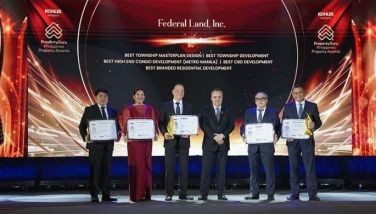Land administration reform to raise sector’s revenues
August 30, 2003 | 12:00am
Government’s prime source of revenue from registration of land titles – the capital gains tax (CGT) – has declined since 1995 from P3.8 billion to P3.5 billion in 2000. This coincided with a decline in CGT returns of almost 20 percent.
Estimates show that the land tax base has declined from P75.8 billion to P58 billion in the same period. The importance of land as a tax base can be seen in the land revenues from BIR and LGU (RPT) which, in year 2000, totaled about P30 billion, or 94.7 percent of all land administration related revenue.
Presently, only a small portion of the population is in the formal system of land markets. In 2001, there had only been about 10 million titles registered. What is disturbing is not only the slow progress to complete land titling throughout the country but also the low level of formal registration of land transactions. Thus, of the total number of registered titles, only about 3.7 percent are formally transacted yearly compared to Thailand’s 13.3 percent.
Further, a 1987 Asian Development Bank (ADB) study showed that the share of informal credit was as high as 70 percent, and this type of credit attracts high interest rates that add to costs. Transactions in the informal sector also have attendant higher risks, give opportunities for unscrupulous persons, cause the register to get out of date, and lead to revenue losses; in short, a lose-lose situation for both the public and government.
On the macro level, the contribution of the real property related sector to the economy has grown less than the overall economy since 1990. Real DGP grew nearly three percent per annum over the decade compared to the real property sector, which grew between 1.5 percent and two percent per annum. This is unusual in developing economies where normally the real property sector is not performing at the same level as the economy is P100 billion in the 10 years from 1990.
With the Land Administration Reform being proposed by the Land Administration and Management Project (LAMP), revenue from real estate taxes is expected to increase by bringing people into the formal system of land titling and registration and retaining them.
During a recent media orientation-forum on the proposed Land Administration Reform Act (LARA), DENR assistant secretary and LAMP executive director Mylene G. Albano said that low title registration stems from numerous problems in the country’s land administration system. Among the problems she cited are the multiple agencies involved in land administration, multiple land laws and regulations, and multiple processes one has to go through.
All these, she said, discourage people from getting land titles and registering them, resulting in low collection from registration fees, transfer, property and other land taxes.
With the proposed reform, these problems can be reduced and land administration can be improved. This way, people will be drawn to acquire land titles and to register these titles, bringing them into the formal system, Albano further said
As a first step towards this reform, LAMP proposes the creation of a single Land Administration Authority (LAA).
Lands Management Services (LMS), National Mappin gnad Resource Information Authority (NAMRIA), and DENR-CARP Secretariat, and the DOJ’s Land Registration Authority (LRA) and Registry of Deeds (RoD).
The Land Administration Reform Act of 2003, which also provides for the creation of the LAA, has been filed both in the House of Representatives and the Senate. It has been included by the LEDAC as a priority administration measure and the President has committed to certify it.
Estimates show that the land tax base has declined from P75.8 billion to P58 billion in the same period. The importance of land as a tax base can be seen in the land revenues from BIR and LGU (RPT) which, in year 2000, totaled about P30 billion, or 94.7 percent of all land administration related revenue.
Presently, only a small portion of the population is in the formal system of land markets. In 2001, there had only been about 10 million titles registered. What is disturbing is not only the slow progress to complete land titling throughout the country but also the low level of formal registration of land transactions. Thus, of the total number of registered titles, only about 3.7 percent are formally transacted yearly compared to Thailand’s 13.3 percent.
Further, a 1987 Asian Development Bank (ADB) study showed that the share of informal credit was as high as 70 percent, and this type of credit attracts high interest rates that add to costs. Transactions in the informal sector also have attendant higher risks, give opportunities for unscrupulous persons, cause the register to get out of date, and lead to revenue losses; in short, a lose-lose situation for both the public and government.
On the macro level, the contribution of the real property related sector to the economy has grown less than the overall economy since 1990. Real DGP grew nearly three percent per annum over the decade compared to the real property sector, which grew between 1.5 percent and two percent per annum. This is unusual in developing economies where normally the real property sector is not performing at the same level as the economy is P100 billion in the 10 years from 1990.
With the Land Administration Reform being proposed by the Land Administration and Management Project (LAMP), revenue from real estate taxes is expected to increase by bringing people into the formal system of land titling and registration and retaining them.
During a recent media orientation-forum on the proposed Land Administration Reform Act (LARA), DENR assistant secretary and LAMP executive director Mylene G. Albano said that low title registration stems from numerous problems in the country’s land administration system. Among the problems she cited are the multiple agencies involved in land administration, multiple land laws and regulations, and multiple processes one has to go through.
All these, she said, discourage people from getting land titles and registering them, resulting in low collection from registration fees, transfer, property and other land taxes.
With the proposed reform, these problems can be reduced and land administration can be improved. This way, people will be drawn to acquire land titles and to register these titles, bringing them into the formal system, Albano further said
As a first step towards this reform, LAMP proposes the creation of a single Land Administration Authority (LAA).
Lands Management Services (LMS), National Mappin gnad Resource Information Authority (NAMRIA), and DENR-CARP Secretariat, and the DOJ’s Land Registration Authority (LRA) and Registry of Deeds (RoD).
The Land Administration Reform Act of 2003, which also provides for the creation of the LAA, has been filed both in the House of Representatives and the Senate. It has been included by the LEDAC as a priority administration measure and the President has committed to certify it.
BrandSpace Articles
<
>
- Latest
Latest
Latest
October 23, 2024 - 9:30am
By May Dedicatoria | October 23, 2024 - 9:30am
October 11, 2024 - 3:45pm
October 11, 2024 - 3:45pm
October 10, 2024 - 11:30am
October 10, 2024 - 11:30am
October 5, 2024 - 12:08pm
October 5, 2024 - 12:08pm
September 24, 2024 - 1:00pm
September 24, 2024 - 1:00pm
September 9, 2024 - 9:45am
September 9, 2024 - 9:45am
Recommended




























